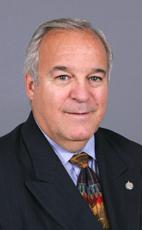Mr. Speaker, first of all, I am pleased to congratulate the hon. member for Kamloops and am very pleased to support this amended bill. The bill recognizes two sports officially as our national sports, hockey and lacrosse, neither of which has ever been officially recognized in the House before as a national sport. I think that is a very positive initiative.
Can there be anyone in the Chamber or anyone in the country who does not know that one sport fascinates and obsesses Canadians from coast to coast to coast? Frankly we know that sport is hockey.
It is our national obsession. It is played by young and old, by male and female, by the able bodied and by the disabled. How well I remember seeing people playing a variation of hockey in a gymnasium, people who had lost the use of their legs. It is our national obsession unlike any other sport, and that is not to denigrate the many other sports Canadians participate in very aggressively, including lacrosse.
Whether it is my young son, Carl, or yours, Mr. Speaker, playing hockey in the backyard or Patrick Roy in the Forum, most Canadians have played hockey at one time or another in their lives, be they citizens in a large city or in one of our hamlets from coast to coast to coast.
Being from southwestern Ontario I can tell the House that the summertime sport of choice there is baseball. It always has been. London, Ontario has the site of the oldest continuous baseball played at Labatt Park. Not to denigrate the sport of lacrosse which I have played a bit, it is not played in some parts of the country. That cannot be said about the sport of ice hockey as we all know. It truly is the national sport of Canadians and I would say the national obsession of Canadians.
We all know that the true world hockey championship is not the Olympics or the yearly world tournament. It is the Canada Cup. That is the true world championship of hockey. Canadian men and women excel at this sport.
It has been said by several members that our women's national team has just won the world championships for the third time in a row. I expect they will add many more times to that championship run.
Hockey is part of our national identity. It helps us to define ourselves. Canadian poet Al Purdy called hockey a combination of ballet and murder. We might not like the second word but it is an aggressive sport. He wrote: "For years a Canadian specific to salve the anguish of inferiority by being good at something the Americans aren't".
The Americans are improving but they have a long way to go to come up to our level. As we all know with the American franchises by far most of their players are Canadians and with the influx of Europeans we are seeing the Americans still have a long way to go to catch us in our national sport.
The impact of the professional sports franchise, the Montreal Canadiens has been mentioned already. It is the most successful of all sports franchises. As several of my colleagues have said-and, my hockey loyalty can be found in this comment-the Canadiens 24 Stanley Cups is a professional sports record. No team in any other sport equals that success level.
I am proud to tell the House that although many early players were French Canadians and the sport was founded in Montreal, it was founded by an Irish Canadian by the name of Ambrose O'Brien. I am proud to note that fact in the debate.
Canadian cities compete to claim these hockey heroes. Being from southwestern Ontario I can say that Stratford likes to claim Howie Morenz as the Stratford Streak, but the people of Mitchell, Ontario, will say that Howie Morenz was born in Mitchell, Ontario.
We have national lessons to learn from the great game of ice hockey. I would like to refer to the most famous goal ever scored. That of course has to be the goal scored by Paul
Henderson to give us victory in the 1972 World Championship against the Russians, the first such series.
As a Montreal Canadiens fan my whole life, I am proud to remind the House that the Henderson goal was made possible by a great play by Yvan Cournoyer to keep the puck in the Russian end, an extraordinary effort when they tried to clear the puck, and then by Phil Esposito who refused to be denied his shot on goal, the rebound of which Henderson then pounced on and put into the net. It has hit me many times for years the symbolism of that goal. Let me give you those three names again: Paul Henderson, Yvan Cournoyer and Phil Esposito. That is the kind of co-operation we need in this country: An English Canadian, a French Canadian and an Italian Canadian working together to help us win a hockey series.
We are most confident, we are most determined and we are most united on a hockey rink. That is a lesson we ought to bear in mind as we support this bill. I applaud this. This is not frivolous in any way. This is an extremely important bill. It is well worth the time for us to take a few minutes in this House and learn the lessons we should be learning from hockey. The fact that we are at our best as a nation when we set aside background, English, French, ethnic, and we work together as a nation. May it always be so.

